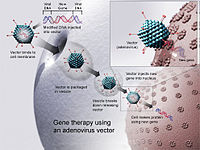
Photo from wikipedia
Advanced Therapy Medicinal Products (ATMPs), such as gene therapies that consist of or contain Genetically Modified Organisms (GMOs) need to comply with the European Union (EU) GMO legislation, as implemented… Click to show full abstract
Advanced Therapy Medicinal Products (ATMPs), such as gene therapies that consist of or contain Genetically Modified Organisms (GMOs) need to comply with the European Union (EU) GMO legislation, as implemented in each EU Member State, before a clinical trial can commence. Complying with GMO requirements is complex, varies significantly across EU Member States and is leading to delays to clinical trials with ATMPs (see Supplemental materials). Such delays and varying implementation of the GMO legislation makes the EU less attractive as a region to conduct clinical trials with investigational gene therapies. This is detrimental to EU patients, since their timely access to these transformative, potentially curative medicines is delayed. Despite recent initiatives coordinated by the European Commission (EC) to facilitate and reduce discrepancies across the EU regarding the application of the GMO requirements, it remains particularly difficult to conduct multi-centre clinical trials with ATMPs containing or consisting of GMOs involving several EU Member States. The recent decision for the EC to temporarily derogate potential COVID-19 treatments and vaccines from some provisions of the GMO requirements was made on the basis of a clear recognition of such complexities and resulting delays to clinical development. The Alliance for Regenerative Medicine (ARM), the European Federation of Pharmaceutical Industries and Associations (EFPIA) and the European Association for Bioindustries (EuropaBio), call upon the EC, together with national competent authorities, to exempt ATMPs containing or consisting of GMOs from the GMO legislation. Such a simplification will eliminate the delays currently reported to occur when submitting environmental risk assessments and GMO applications to the national competent authorities. An exemption from GMO requirements will make the EU a more attractive region for clinical development of gene therapies and could accelerate European patients' access to these potentially life-saving medicines. Maintaining a system for GMO assessment that is different across countries may also prevent ATMPS from realising the full benefits of a harmonised clinical trial approval process under the Clinical Trials Regulation. The undersigned organisations to this publication urge the EC to use its right of initiative to put forward a legislative proposal to exempt ATMPs in clinical development from the EU GMO legislation, within the timeframe proposed in the 2020 EU Pharmaceutical Strategy (by 2022). 1 Implementation of a GMO exemption scheme before the end of the transition period for the Clinical Trial Regulation (the end of 2023) is important to avoid new CTA submissions for ATMPs under the Clinical Trial Regulation having to conduct the whole GMO assessment process in parallel. It is considered that ATMPs such as human somatic cells modified ex vivo, recombinant virus-based vectors, including those containing genome editing nucleic acid sequences, pose negligible risk to the environment. Outside of controlled storage conditions, gene therapies cannot survive for any appreciable length of time. Upon clinical administration, any recombinant gene therapy viral vector particles that do not enter host cells are diluted within the body and if excreted are in such low multiplicity to no longer be viable or considered infectious to persons, animals or living organisms within the environment. Any nucleic acids released into the environment are rapidly degraded.
Journal Title: Human gene therapy
Year Published: 2021
Link to full text (if available)
Share on Social Media: Sign Up to like & get
recommendations!